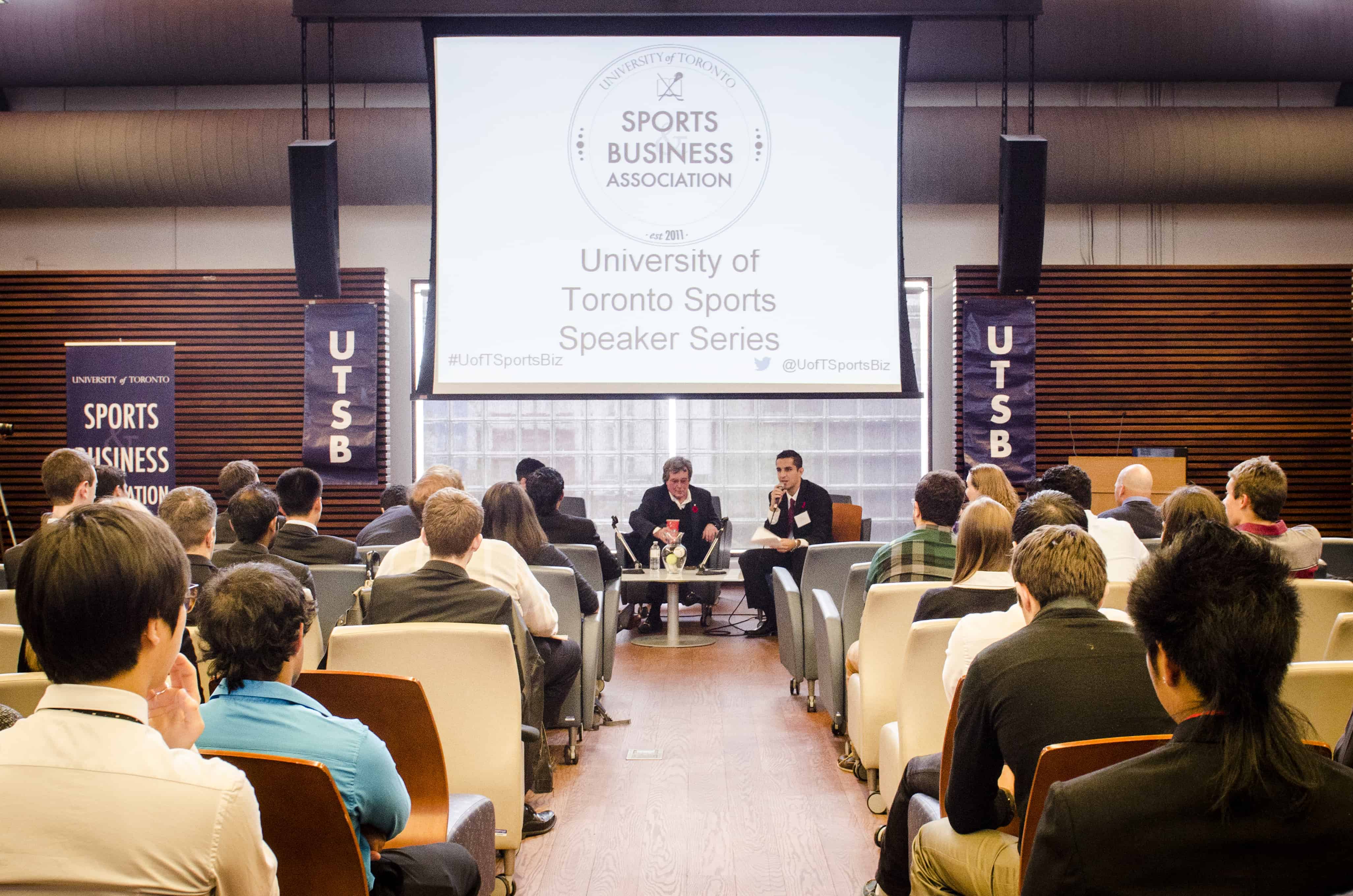The University of Toronto Sports and Business Association (UTSB) hosted the first in its “Sports Speaker Series” addressing the development of sports in Canada this past Friday.
Founded in 2011 by a group of students passionate about working in the sports industry, the UTSB works to provide students with insight into the skills necessary to succeed in careers in the sports indutry.
For their next event, the UTSB is organizing a trip to see a Toronto Raptors game and a networking session with Chuck Swirsky and other Maple Leaf Sports and Entertainment executives.
In March, they will host their second annual Sports Industry Conference, which will feature more leaders from the sports-business world who will network, mingle, and talk with students.
Friday’s event featured leaders from the sports business world who provided insight to students about careers in sports business, and spoke about their sport’s recent development in Canada.
The event began with a Q&A with Paul Beeston, the former president of MLB and current president and CEO of the Toronto Blue Jays and Rogers Centre.
Beeston spoke about his career trajectory and the concrete steps that he and the Blue Jays are taking to develop baseball in Canada and increase its popularity within the country. These steps include moving one of the Blue Jays’ farm teams from Auburn, New York to Vancouver, and another from Las Vegas to nearby Buffalo.
“The opportunity came to go to Vancouver, so we moved the team there for the last two years” said Beeston. “The good thing about it is that all our good prospects go through there, so all of the people of Vancouver will see these players.”
“I think it’s important to use the whole country, and part of it is not just being Toronto-centric,” continued Beeston. “We feel the obligation and plan on carrying through with it.”
Mira Sirotic from Certified Management Accountants talked to students about potential careers in accounting and how careers in the sports business world can be achieved as a CMA.
Next came a panel discussion featuring Rowan Barrett, EVP and assistant general manager for the senior men’s national basketball team; Michael Downey, president and CEO of Tennis Canada; Peter Montopoli, general secretary for the Canadian Soccer Association; and Darryl Boynton, manager of Hockey Canada’s Regional Centre.
The speakers focused on the development of their respective sport in Canada, providing examples of recent growth. Each panelist also noted how Canadian athletic results at the international level have improved significantly in recent years, due in large part to smart business moves at the sports-business level.
Barrett addressed the issue of talented young Canadian basketball players being recruited by American high schools as early as the eighth grade and choosing to play south of the border in order to take advantage of the increased competition relative to Canadian high schools, and the heightened level of media exposure.
Examples include Thornhill, Ontario native Andrew Wiggins, who is projected to be the top pick in the 2014 NBA draft but is currently playing high school basketball in Huntington, West Virginia rather than at home in Canada.
“We have to be honest with ourselves and say ‘Can we really develop an Andrew Wiggins here in this country to the level that he needs to be developed?’” noted Barrett. “One of the things we’re looking at is whether we can potentially take players between 12 and 15 years old and work to put them in an environment where they’re training as they do in many other countries such as Australia.”
Downey noted that developing successful Canadian tennis players, such as Milos Raonic, can create role models for Canadian children and encourage them to start playing the sport and possibly give them the confidence to compete at the international level.
“When Peliwo and Bouchard won the Junior Wimbledon, one of the first things they spoke about was the confidence that Milos brought to them. If he could do it, why couldn’t they do it?” said Downey.
Montopoli talked about the process that took Canada’s women’s soccer team from last place at the FIFA women’s world cup to medals at the 2012 London Olympics. This included recruiting head coach John Herdman, “the best technical leader in women’s football. Finally, Boynton, discussed hockey participation rates, which have declined consistently in recent years. Only nine per cent of children currently participate in organized hockey, and Boynton sees an uphill battle to maintain that number.
“We’re looking at a loss of tens of thousands of players over the next 10 years or so, and to be honest, everyone on this panel has probably done a better job than we have at growing their sport and growing the opportunities for children to be exposed to them,” said Boynton.
The event concluded with keynote speaker Ian Troop, CEO of the Toronto 2015 Pan/Parapan American Games Organizing Committee. Troop spoke at length about the installation of facilities in the GTA and the implications these facilities and investments will have on driving sports participation in Canada and providing national athletes with world class facilities.
Troop finished his talk by offering valuable advice that has helped him shape his career.
“It’s not the will to win that matters — everyone has that,” said Troop, quoting legendary Alabama football coach Paul “Bear” Bryant. “It’s the will to prepare to win that matters.”


